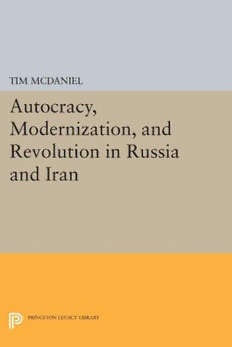
Autocracy, modernization, and revolution in Russia and Iran PDF
Preview Autocracy, modernization, and revolution in Russia and Iran
AUTOCRACY, MODERNIZATION, AND REVOLUTION IN RUSSIA AND IRAN AUTOCRACY, MODERNIZATION, AND REVOLUTION IN RUSSIA AND IRAN Tim McDaniel PRINCETON UNIVERSITY PRESS PRINCETON, NEW JERSEY Copyright © 1991 by Princeton University Press Published by Princeton University Press, 41 William Street, Princeton, New Jersey 08540 In the United Kingdom: Princeton University Press, Chichester, West Sussex All Rights Reserved Library of Congress Catalqging-in-Publication Data McDaniel, Tim. Autocracy, modernization, and revolution in Russia and Iran/ Tim McDaniel. p. cm. Includes bibliographical references and index. ISBN 0-691-03147-9 ISBN 0-691-02482-0 (pbk.) 1. Soviet Union—History—Revolution, 1917-1921—Causes. 2. Iran—History—Revolution, 1979—Causes. 2. Soviet Union— Social conditions—1801-1917. 4. Iran—Social conditions. I. Title DK265.M3743 1991 303.4'3'0947—dc20 90-20191 CIP First Princeton Paperback printing, 1993 This book has been composed in Linotron Galliard Princeton University Press books are printed on acid-free paper, and meet the guidelines for permanence and durability of the Committee on Production Guidelines for Book Longevity of the Council on Library Resources Printed in the United States of America 10 9 8 7 6 5 4 32 TO DEAR CHILDREN OF FRIENDS AND RELATIVES, IN ORDER OF AGE: Misha, Jacob, Tim, and Ryan Contents Acknowledgments ix Introduction A Contradictory Route to Industrial Society 3 One Historical Legacies 14 Two Autocracy in Russia and Iran 48 Three Dimensions of Modernization 70 Four Dilemmas of Autocratic Modernization 88 Five The Cities in Revolution 111 Six Autocracy, Landlords, and Peasants 149 Seven Cultures of Rebellion 185 Conclusion Structural Crisis and Revolutionary Dynamics 218 Select Bibliography 233 Index 237 Acknowledgments I AM GRATEFUL for the help of many friends and colleagues who read this book in manuscript form and made valuable suggestions for improve ments. Above all, I want to acknowledge the encouragement of Andy Scull, who at many points had more confidence in the outcome of this project than I did, and whose comments were invaluable. A number of other people read the manuscript carefully and offered much advice, saving me from errors of fact and interpretation. In this regard I particularly want to thank Ervand Abrahamian, Said Amir Arjomand, Victoria Bonnell, Daniel Chirot, AIi Gheissari, Jack Goldstone, Michael Mann, and Jeff Weintraub. I have discussed my ideas on these issues with Gershon Shafir and Carlos Waisman, from whose knowledge and friendship I have bene fited in innumerable ways. Nikki Keddie was kind enough to invite me to a conference she organized at UCLA, at which I was able to discuss my work with a number of Iranian specialists. I am grateful to her for the invitation and encouragement. Pat Stewart and Barbara Stewart gave ad vice on the preparation of the manuscript and facilitated its completion. My editors at Princeton, Margaret Case and Gail Ullman, have done a wonderful job with a manuscript that does not fit any easy classifications. I am also grateful to Brian MacDonald, my copy editor, for a first-rate job with the text. Finally, I would like to acknowledge the importance of some thing less tangible, the atmosphere created by my colleagues at the De partment of Sociology at the University of California, San Diego, who have provided an unusually supportive environment for this kind of en deavor. A Note on the Transliteration Readers will notice some inconsistencies in spelling of a number of Middle Eastern words and names. The reason is the following: I adopted a single transliteration for my own use, but when the name appeared in another form in a text that I cited, I followed the latter. This explains, for example, the usage of both Al-e Ahmad and Al-i Ahmad for the same man.
